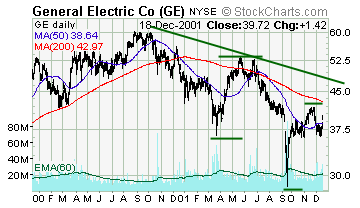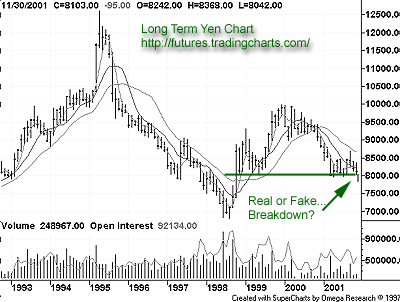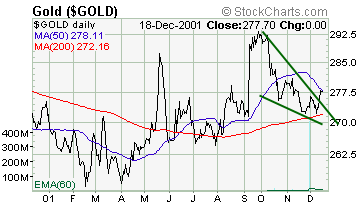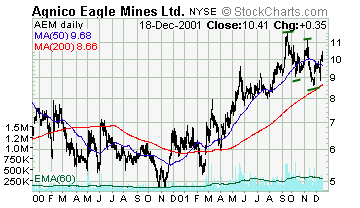December 18, 2001
Global Market Commentary
Operation
Buy
- a Treasury coup, with some help from the
Bank of Japan
Wall Street has been waiting for tomorrow all month long. What's going on tomorrow? Operation Buy, a coup for dollar policy if the Bank of Japan submits to recent political pressure and allows a yen devaluation to support global bond prices and stimulate the Japanese export sector. But gold shares might just steal the show...
Under the suspect assumption that the Bear Market is over, General Electric Co Bulls roared loud this morning, and sent bears scrambling for cover.
GE shares gapped by $1.45 at the open. Then they churned to end three cents off that high, made in the minutes after the bell rang. What can we say except that Bulls rallied into the third period on yesterday's news about tomorrow? (referring to our coverage of this in yesterday's daily outlook to subscribers)
Volume was a heavy 33 million shares. The gap could be a runaway, and carry enough momentum to at least charge for heavy resistance at $42.50, about 6% higher than today's close. A successful breach of that resistance would mean only that the post Sept trend is in continuation, rather than consolidation, as the chart currently implies.
That said the trend that controls GE's bear market will be intact even if bulls make a higher high here this week.
 A
straight trendline pits bear market resistance near $50. A more scientific
approach to technical analysis pits bear market control at the last lowest
high in the primary sequence, which just happens to be this year's high
at around $53. The peak in 2000 was at $60, which is the first high in
this sequence.
A
straight trendline pits bear market resistance near $50. A more scientific
approach to technical analysis pits bear market control at the last lowest
high in the primary sequence, which just happens to be this year's high
at around $53. The peak in 2000 was at $60, which is the first high in
this sequence.
The statistical approach would pit bear market resistance at the 200-day, or 50 week, moving average near $43 at the moment. Today, GE shares closed at $39.72.
A $13 rally is required to challenge real bear market resistance. Though even such a test represents a 33% gain from today's handle. Will they do it? I dunno.
Momentum is back but coming off of lower ground on the indicators. There is not enough substance in Jeff Immelt's (new GE CEO) outlook in our view to cut it. We've learned that in order to guarantee the bullish profit forecasts (that we reported on yesterday), GE plans to slash 3000 jobs at GE capital, and consolidate (or divest?) about 24 different businesses, which will incur about $400 million in savings. That's all great as far as running a business goes, but the point is that this model assumes a business contraction.
The point here being that when analysts interpret this as a sign that confirms their bullish views on the economy, that this marks an end to the profit contraction, they are sadly mistaken as professionals.
In order to challenge "fundamental" bear market trend control, there would have to be at least a little more optimism about the top line in yesterday's pep talk. At the moment, top line growth forecasts are for about 10% next year, but much of that is explained by the raft of acquisitions GE intends on making. According to Bloomberg:
"General Electric, the largest company by market value, expects to make acquisitions of industrial businesses that will add $1 billion in profit and $7 billion in sales by 2003. It expects to continue to make purchases in its finance operations. Those figures aren't included in the $100 billion in possible acquisitions the company is looking at right now, including purchases at GE Capital with about $300 billion in assets, Immelt said. ``Top line growth has been slowing with the economy,'' said Jeff Graff an analyst with Key Asset Management in Cleveland, which owns about 26 million GE shares. ``GE will make acquisitions of key technologies a bigger part of their growth strategy.'' - Bloomberg
So to expect a multiple expansion (rising PE ratio) in that environment, when the shares are already trading at 29 times trailing 12 month earnings, or 25 times 2002 "anticipated" earnings, is to require a lot of bullishness. Far more than we've got.
There is no question that managements prefer to acquire assets with stock, and so to the extent that this is the case here, we may have to consider that the vested interests "want" to move their shares higher. But so what. Vested interests always want to move their stocks higher, unless they're playing games.
To justify current valuations, earnings must grow at around 20% into the future. Such an outlook is sustainable in a BENIGN economic expansion, but is not when the economy is contracting and such profit growth increasingly depends upon internal divestitures, or downsizing. And while earnings have grown at that rate for GE in the past, here and there, its long run growth is closer to 12% (10 year annual growth rate in earnings according to Valueline).
From 1991 to 1995 the market priced GE's earnings near 15 times earnings. From 1996 onward, the market doubled that value - the average annual PE ratio for the past five years is 30. From 1996 to about last year, however, the rapidly expanding stock market economy boosted the growth rate in earnings to closer to 20% annually. Such conditions are dangerously assumed to remain into the future despite their conspicuous cyclical nature.
What Jeff Immelt is promising is that GE can continue to grow its profits at that rate into the future, despite a shrinking economy, rising interest rates, and if we're correct, a falling dollar and rising inflation? If it can great, but all of those macro variables will also affect how the market will price those earnings.
Will it continue to price GE's earnings at 30 times, as it is today? If so, then there is no upside at all, except in the short term. Any meaningful upside in GE's valuation future will require an expanding economy with relatively low interest rates and a firm dollar. In other words, due to its current valuation, further upside or downside is largely going to be determined by macro circumstances. Of course, in charge of those circumstances are the world's policymaking classes.
This brings us to the short term, and whether the Bank of Japan tomorrow will announce that they have submitted to political pressures (from within and outside of Japan) and will begin buying up the global bond (though dollar bulls would say US Treasury) market.
Please don't underestimate the impact this is going to have on the markets, near and far. And we aren't making any inferences between GE capital's interests and our government's economic interests, aside from the bullish spillover that GE's shares are likely to get if the Bank of Japan boosts global bond prices in the morning.
Again, the Bank's Governor has ruled out any radical measures such as buying foreign bonds, commercial paper, or more JGB's, according to Bridge. But markets are waiting for something, if only just further easing steps.
 If
that is all that comes, the recent yen decline will become vulnerable
to reversal. That means we think it will rise, and blow back through 127
(back above the green line on the chart to the right).
If
that is all that comes, the recent yen decline will become vulnerable
to reversal. That means we think it will rise, and blow back through 127
(back above the green line on the chart to the right).
If that proves to be correct, our bearish argument for the dollar and stock markets should take over, and all heck should break loose, since stock and dollar bulls are all lined up ready for a major yen devaluation.
If, on the other hand, the Bank of Japan actually does announce radical measures to affect such a devaluation, or one materializes because our guess is wrong, then Operation Buy is on, and Wall Street should get impetus as bond prices extend today's rally into the weekend at least, and perhaps until global investors begin to grasp all the implications associated with such an intervention, or change in policy.
One of the first things it will say, taken with recent ECB accomodation, is that dollar policy dominates global banking policy.
And it should, for the dollar, not gold, is the global international monetary standard, or preferred "vehicle" currency. By "should," of course, we mean as far as policymakers are concerned. For as far as we're concerned, banking policy contradicts free market doctrine. In fact, at extremes, it oppresses free market doctrine, with consequences.
 It
is no coincidence then that with all of the currency tinkering and policy
positioning dominating capital markets today, the precious metals markets
have been acting up again.
It
is no coincidence then that with all of the currency tinkering and policy
positioning dominating capital markets today, the precious metals markets
have been acting up again.
December gold now reversed a three month wedge (though this chart is daily spot), following silver bulls who late last week set off buy signals by breaching bear market resistance at $4.30, and that after Platinum and Palladium rallied in early December.
Gold shares too have been acting well, and this time indeed have predicted the (later) surge in the yellow metal.
Leading the gold bulls today on North American exchanges were Durban Deep, Placer Dome, Anglo Gold, and Agnico Eagle, all up from as much as 12% to 4%.
That wasn't enough to put the gold sector in the top ten performing stock sectors today, but it was enough to put it in the top 15. Metals were second.
 Durban
Roodeport Deep was able to repay a sizeable loan today, which helped its
shares post new 52-week highs.
Durban
Roodeport Deep was able to repay a sizeable loan today, which helped its
shares post new 52-week highs.
Placer put in a higher high and has approached bear market control near $12, with conviction.
Anglo made it through intermediate bear market resistance, while Agnico Eagle, like Placer, has pushed itself up to within $0.50 of the breakout region.
Growing speculation that Barrick is going to bid for Normandy sent its shares higher in Sydney overnight. Whether true or not, it is an indication of the strengthening sentiment for gold shares.
The rest of this week is going to be pivotal for the dollar, perhaps the precious metals, and certainly gold shares.
The outcome of Operation Buy, tomorrow morning, should decide short run direction in these markets. It just might be gold shares that rock and roll, rather than GE.
Author
Edmond J Bugos
mailto:gold@goldenbar.com
![]()